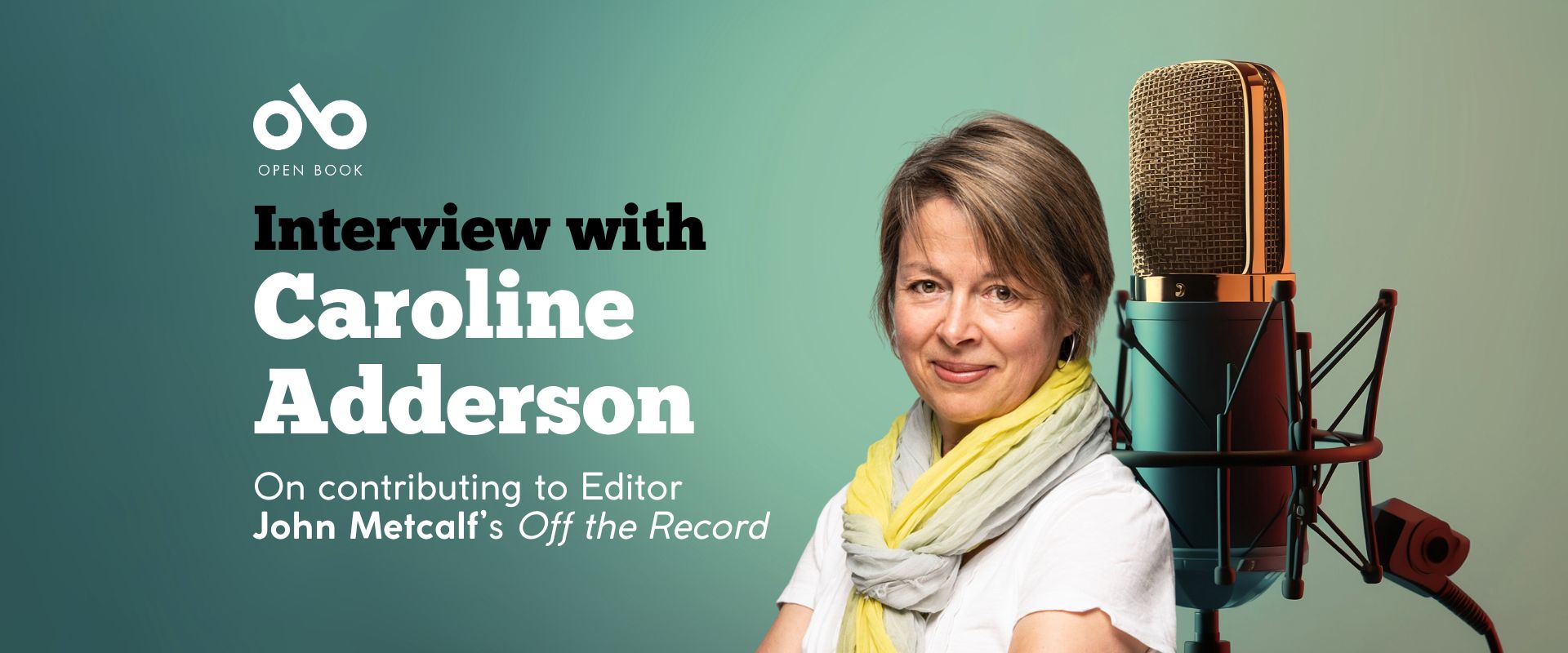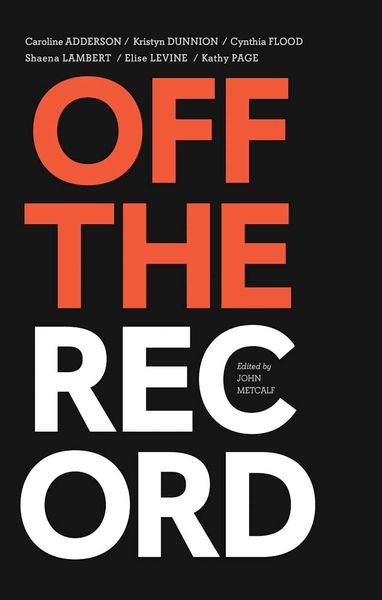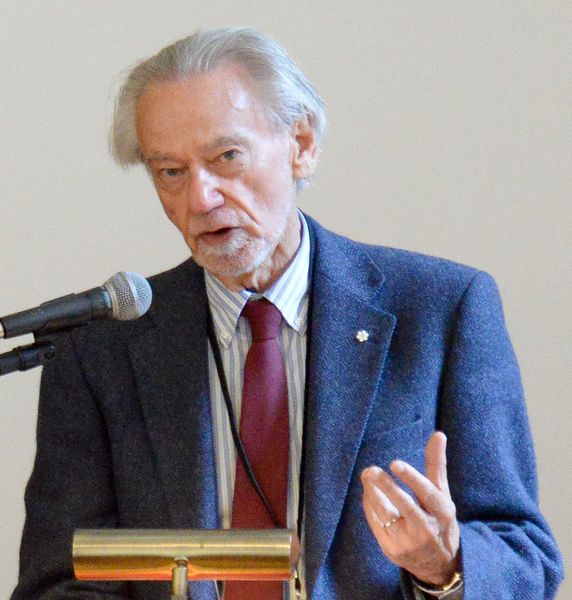Caroline Adderson on John Metcalf, Why Editors are So Valuable, and the Importance of Reading the Instructions
Behind the scenes of Canadian literature, few have had a bigger influence and impact than editor John Metcalf. Known for his his own fierce and often satirical writing, particular in the short story form, he has also shaped and shepherded countless Canadian authors, many of whom credit their careers to his guidance and insightful criticism.
Named a Member of the Order of Canada in 2004 for his cultural contributions, Metcalf has continued to mentor and champion writers across the country even into his 80s.
In a new collection of essays, Off the Record (Biblioasis), Metcalf challenges six decorated Canadian authors to consider and share just how they became writers. Each essay is accompanied by a short story, showcasing each writer's literary identity and style, and providing insight into how each writer approaches their work and their editorial relationships.
Caroline Adderson, Kristyn Dunnion, Cynthia Flood, Shaena Lambert, Elise Levine, and Kathy Page all contribute to the collection, and today we're speaking to Adderson about her involvement and what it was like to be part of Metcalf's vision for the book.
She tells us about how important Metcalf has been to her over the course of their 30-year long editorial relationship, from his encouragement to his perfectly printed letters; teases a funny and intriguing detail about why she became a writer; and discusses the sobering economic reality of a writing life in this day and age.
Open Book:
Tell us about Off the Record and how you became involved with it.
Caroline Adderson:
John Metcalf proposed the project to me in 2020. When I heard who else he was going to include—some of my very favourite short story writers!—I immediately agreed.
OB:
John Metcalf has been a supportive and influential editor for many. How did you come to work with him and what has his role been in your writing life?
CA:
Our connection goes back to 1992, when he edited my first book, Bad Imaginings. Over the years he’s selected a number of my stories for the Best Canadian Stories series, as well as championed my work in print, including in his 2018 door-stopper, The Canadian Short Story. I’m thrilled that we’re finally doing another collection together, A Way to Be Happy, to be published by Biblioasis next fall.
But John’s main role in my life has been as a friend. I’m a very lucky recipient of his meticulous correspondence, on stationary bearing the Metcalf crest, which features three calves with forelegs daintily lifted, as though to stamp the ground over some literary outrage. No cursive for John. He prints, always with the same black marker and rarely any cross-outs, thoughts pouring in perfected form from his nib. These letters have amused and supported me for decades.
Your CanLit News
Subscribe to Open Book’s newsletter to get local book events, literary content, writing tips, and more in your inbox
OB:
How do you view the relationship between author and editor? Have there been any memorable editorial moments in your career?
CA:
The editor’s role, in my opinion, is to help the author write a better book than even they aspired to. Practically speaking, this involves pointing out what’s working and what's not and, hopefully, offering possible solutions to the problems. Sometimes asking the right questions is enough. Why doesn’t she have a face? Why is this scene here? What the hell is going on? Anything to help the writer see the story freshly. But technical expertise is only half of it; the other half is moral support. Writers labor for years in near-solitary confinement, plagued by doubts and insecurities. By the time an editor comes into their lives they’ve often regressed to a child-like state of pathetic neediness. Enthusiasm and encouragement are the editor’s superpowers. (Likewise, crapping all over a manuscript generally results in the author curling into a ball with a bad case of agraphia.) I’m happy to report that John has always employed his superpowers with me.
My most hands-on editing experiences have been with my children’s editors: the late Sheila Barry, Yasemin Uçar, Karen Li, Tara Walker, Sarah Howden—all of them brilliant. I couldn’t have written those books without their skillful input, and their rah-rah-rahs. But I have to single out Shelley Tanaka, who for a couple of my books persisted through overly-complex and ill-conceived versions of the story until we finally, together, got it right.
OB:
These pieces ask authors to discuss how and why they ended up as writers, specifically, rather than in other professional roles. Without giving your contribution to the book away, can you tell us a little bit about how you found your path as a writer (or how writing found you)?
CA:
I’m so embarrassed about this! I wish could say becoming a writer had been my dream since childhood and that I’d written my first novel at ten. Alas, it never occurred to me. I signed up for a creative writing course in university as an act of revenge. You’ll have to read the book to find out more...
OB:
Why do you think the role of the writer continues to fascinate us collectively?
CA:
I think it’s because the agonizing provenance of a novel or story isn’t apparent in the finished work. As we read it, it seems to sing to us, effortlessly. We think: I’m a literate person, I should be able to dash something like this off too. Combined with all the romantic myths of the writing life—Paris in the ‘20s, or making millions off self-published soft porn—it seems so much more appealing than the 9-5 alternative. I teach a class called Fiction Series for the Weekend Student at Simon Fraser University and always conclude with a talk on the economics of the writing life, which are only getting worse with the decline of our reading and reviewing culture and the flagrant refusal of educational institutions to recognize copyright. The shock on their faces! Really, I should start the course with that, but then they’d all drop out and I need the money.
OB:
Did anything surprise you or did you learn anything unexpected you while you were writing your contribution to Off the Record?
CA:
I regret that I didn’t craft my contribution as an essay per se. John mailed me his questions in seven groups over many months. I then smooshed together my responses in the form they appear. The other contributions seem so artful, particularly Elise Levine’s, which is both beautiful and harrowing. So I guess I learned to pay more attention to the instructions!
But my overwhelming feeling as I read the proofs was gratitude. Somehow, over thirty years, I’ve cobbled together a livelihood through writing without being famous or resorting to a tenured university job. After gratitude came sadness—for the generations of writers behind me who face not only the above-mentioned challenges, but our current cost of living crisis. How will they survive?
________________________________________________
Caroline Adderson is the author of five novels (A History of Forgetting, Sitting Practice, The Sky Is Falling, Ellen in Pieces, A Russian Sister), two collections of short stories (Bad Imaginings, Pleased to Meet You) as well as many books for young readers. She is also the editor and co-contributor of a nonfiction book of essays and photographs, Vancouver Vanishes: Narratives of Demolition and Revival and guest editor of Best Canadian Stories 2019. Her work has received numerous award nominations including the Sunday Times EFG Private Bank Short Story Award, the International IMPAC Dublin Literary Award, two Commonwealth Writers’ Prizes, the Governor General’s Literary Award, the Rogers’ Trust Fiction Prize, and the Scotiabank Giller Prize longlist. In 2017, she was a YWCA Women of Distinction Award for Arts, Culture and Design nominee. Her awards include three BC Book Prizes, three CBC Literary Awards, the Marian Engel Award for mid-career achievement, and a National Magazine Award Gold Medal for Fiction. Her latest collection of short stories, A Way to Be Happy, will be published in fall 2024 with Biblioasis.
John Metcalf has been one of the leading editors in Canada for more than five decades, editing more than two hundred books over this time, including eighteen volumes of the Best Canadian Stories anthology. He is also the author of more than a dozen works of fiction and nonfiction, including Finding Again the World: Selected Stories, Vital Signs: Collected Novellas, An Aesthetic Underground: A Literary Memoir, and The Museum at the End of the World. Senior Fiction Editor at Biblioasis, he lives in Ottawa with his wife, Myrna.







